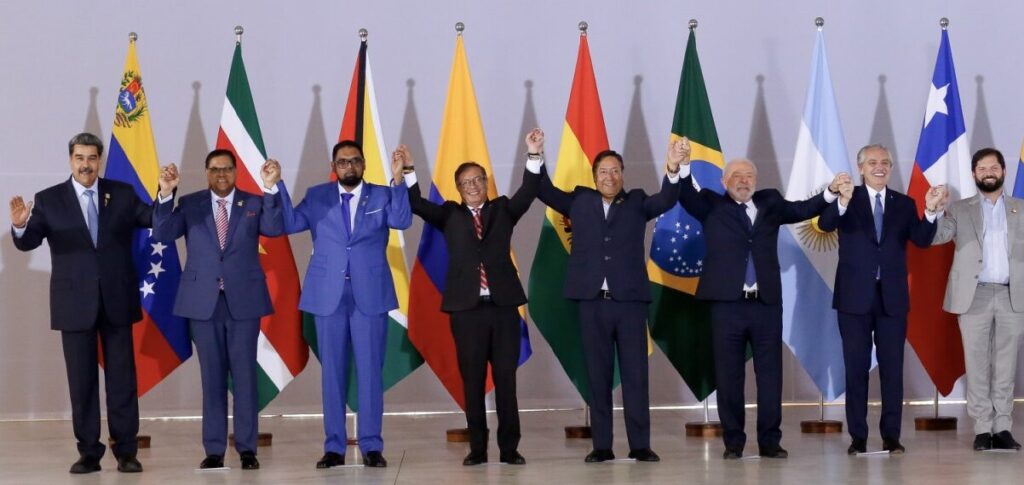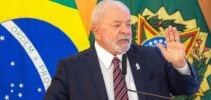For the first time in almost a decade, the leaders of South American nations met to discuss cooperation projects and try to restore regional integration, after Unasur foundered amid political changes in the countries.
ADVERTISING
“In the region, we let ideologies divide us and interrupt integration efforts. We abandoned dialogue channels and cooperation mechanisms, and as a result we all lost,” said Lula before a closed-door meeting with the other leaders at the Itamaraty Palace. “The elements that unite us are above ideological differences,” she added.
However, the president of Uruguay, Luis Lacalle Pou, highlighted the weight of the divisions that remain in the region. The center-right leader criticized Lula's defense of Nicolás Maduro, when the Brazilian president assured that accusations of authoritarianism in Venezuela were the result of a “narrative”.
“I was surprised when it was said that what happens in Venezuela is a narrative,” said Lacalle Pou during his speech before Lula and the other leaders present, which he broadcast live on his social networks.
ADVERTISING
“The worst thing we can do is cover the sun with a sieve […] Let’s give [Venezuela] the name it has and help”, said the Uruguayan president, who classifies Maduro as a “dictator”.
The Chilean head of state, Gabriel Boric, took the same line, pointing out that the Venezuelan situation “is not a narrative construction”, but “a serious reality”. “Human rights must always be respected,” he declared.
But Boric also agreed with Caracas' repeated call to ask the United States and the European Union to lift sanctions on Maduro and his government.
ADVERTISING
Maduro, in turn, responded by indicating that these countries “have one vision” and Venezuela, “another”. “The most important thing is that there was a debate,” he stated, announcing “a new phase” of South American integration.
The Venezuelan leader's departure from the Itamaraty Palace late this afternoon attracted a crowd of journalists and there was confusion, which ended with security agents attacking communicators.
And Saudi Arabia?
Lula, who resumed diplomatic relations with the Venezuelan government that had been severed by his predecessor Jair Bolsonaro, received Maduro in Brasília with honors on Monday, and celebrated the “beginning of the return” of the Chavista leader to the South American scene.
ADVERTISING
After the meeting, Lula reiterated that “there is a narrative in the world that there is no democracy in Venezuela and that he [Maduro] made mistakes”, and, on the other hand, highlighted that the neighboring country is experiencing an unusual “tranquility”.
“The same demands that the democratic world makes for Venezuela, it does not make for Saudi Arabia,” said Lula at the press conference.
Lack of common projects
Eleven presidents participated in the meeting defined by Lula as a “retreat” to discuss in a relaxed and frank manner.
ADVERTISING
In addition to the presidents already mentioned, Argentine Alberto Fernández was present; Colombian Gustavo Petro; the Paraguayan Mario Abdo Benítez; the Ecuadorian Guillermo Lasso; Bolivian Luis Arce; Guyanese Irfaan Ali, and Surinamese Chan Santokhi. Peru, in turn, was represented by chief of staff Alberto Otárola.
The meeting concluded with a consensual declaration in favor of strengthening integration to “face shared challenges” and increase commercial exchange and investments, but without concrete agreements.
A working group made up of the chancellors of the 12 countries was also created, which should meet within 120 days to analyze progress.
South America “is united in speeches, but not in concrete projects”, Colombian Petro had declared to journalists upon arrival.
'Brotherhood' vs 'plurality'
The last meeting between South American leaders was in 2014, during the Unasur summit in Quito.
Created in 2008 by Lula (2003-2010), the Argentine Néstor Kirchner and the then Venezuelan president, Hugo Chávez, to counterbalance American influence in the region, the Union of South American Nations was criticized by some, for years, for having a leftist bias.
“We had a brotherhood,” said Lula. “That no longer exists, [now] it is more plural and we need to learn to live with this plurality,” she added.
Paralyzed after conservative triumphs in the region and disagreements between countries due to the Venezuelan crisis, the bloc is currently without a budget and without a headquarters.
Only Bolivia, Guyana, Suriname, Venezuela and Peru — which never left the bloc — remain in UNASUR, in addition to Brazil and Argentina, which returned this year.
Receive news and newsletters do Curto News by Telegram e WhatsApp.




